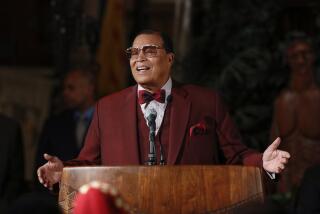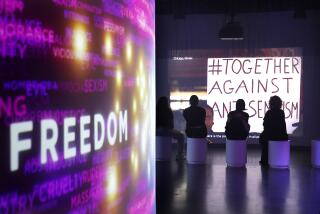Bigotry’s Divisiveness
- Share via
Louis Farrakhan has stirred extraordinary controversy and concern and attracted attention disproportionate to his authority and influence in the black community and in the United States, but this was inevitable. It was inevitable because part of the message he preaches is based on racism, disrespect of other religions, an inflammatory and confrontational approach that tears at the carefully constructed fabric of national unity, tolerance and compassion.
With his address Saturday in Southern California, he has, in fact, created two controversies. One has to do with how best the community should have received him. The other has to do with the ideas he expounded.
Community groups and political leaders were divided on whether they should anticipate his speech with condemnations of the anti-Semitism that had characterized earlier public statements or whether they should await his words and then offer judgment. We, as a newspaper, chose to wait, for we wanted to avoid violating the right of free speech with comments that might be construed as prior censorship, we knew there was no ambiguity in the mind of the community regarding our absolute opposition to anti-Semitism, and we felt a confidence in the way this community would respond even if he were to repeat his most odious comments regarding Jews and their religion.
That confidence was validated by the absence of violence, and by the cheers of his audience, loudest when he reached out to the Jewish community with a word of conciliation, and when he sought to rally blacks to help themselves.
His message was less vitriolic than some he has delivered in recent months. But that cannot excuse the sordid malevolence of his discussion of Judaism, accusing Jews of “disbelief in God” and “wicked hypocrisy.” His own hatred seemed revealed in his statement to whites that they act “out of guilt knowing you hate the Jews yourself.”
“We weep for Jews, but who weeps for us?” he said, but in the context of his address it was a statement that served neither to heal the damage he has done to black-Jewish relations nor to place in context the process of the civil rights movement in the United States that has brought progress to blacks.
The terrible risk of what Farrakhan has chosen to do is that he will somehow fracture the ties that have been created between blacks and Jews, and that he will encourage the substitution of raw racism and destructive religious intolerance for the struggle for equality and justice.
He is right to raise the failures of the American system to fulfill the promise of the Founding Fathers to all citizens. Blacks should be angry at the poverty and unemployment that overwhelm vast segments of their people. His program of self-help, his encouragement of self-respect are vital messages that can change lives, substitute hope for despair. Much remains to be done before blacks are allowed to share fairly in American society and the American economy.
But he has obscured that message with his vicious bigotry. And, as one rabbi commented, he has preached divisiveness when the issues to be resolved require unity.
More to Read
Sign up for Essential California
The most important California stories and recommendations in your inbox every morning.
You may occasionally receive promotional content from the Los Angeles Times.













